Iranian Paramilitary Commander Repeats Threat To Destroy Israel
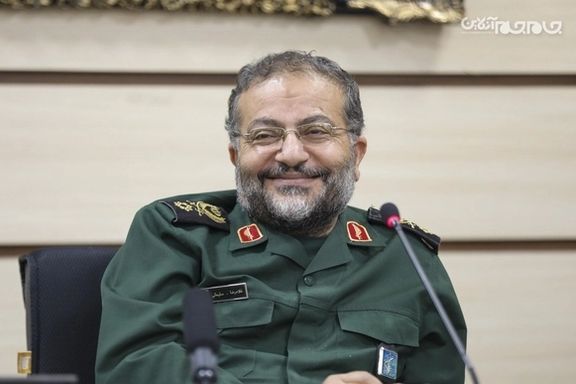
In remarks indicating deep antisemitism, the commander of Iran’s Basij militia said on Thursday that Jewish hostility towards Islam has existed since the advent of the religion.

In remarks indicating deep antisemitism, the commander of Iran’s Basij militia said on Thursday that Jewish hostility towards Islam has existed since the advent of the religion.
The Islamic Republic will steadily continue its attempts to destroy Israel in line with “The Second Step of the Revolution,” Gholamreza Soleimani added.
The Second Step of the Revolution was a term coined by Iran’s ruler Ali Khamenei, in 2019 on the 40th anniversary of the Islamic revolution. At the time Khamenei pledged resistance against “the American and Zionist domination” in the region.
Khamenei also stated in 2015 that Israel must be destroyed within 25 years, a remark that has been repeatedly cited by Tehran officials ever since.
It is worth noting that despite these threats, many citizens in Iran have largely refused to follow the regime’s anti-Israel and antisemitic rhetoric. Amid a wave of pro-Palestinian rallies across the world, hardliners in Iran have admitted that the general public there have little appetite for the Palestinian cause.
The Islamic Republic, the primary supporter of Hamas, has provided military and financial assistance to the militant organization which launched a deadly onslaught on Israel on October 7, killing 1,200 and taking over 240 people hostages. However, so far, Tehran has refrained from direct involvement in the war to defend its ally.
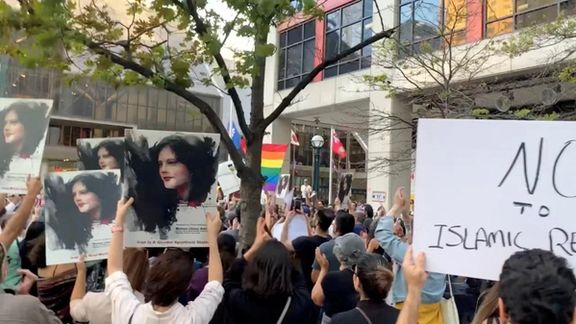
Canadian officials have told Iran International that 10 individuals affiliated with the Islamic Republic have been found “inadmissible” and must leave the country.
Canada Border Services Agency (CBSA) spokesperson Maria Ladouceur stated that “To date 10 individuals have been reported inadmissible by the CBSA for being a senior official in the Iranian regime.”
She added that nine of these individuals have been referred for an admissibility hearing before the Immigration and Refugee Board of Canada, as one of them has already left the country. The CBSA also urged Iranians residing in Canada to provide any information they have about affiliates of the Islamic Republic to the agency.
Only one of the 10 has been identified so far as Salman Samani, 42, a former high-ranking Iranian interior ministry official living in Toronto. As reported by Global News, Canadian authorities have initiated proceedings against the former deputy interior minister, who is the subject of sanctions imposed a year ago against officials of the Iranian regime. Anna Pape, spokesperson for the Refugee Board, confirmed that Samani's case “was referred for an admissibility hearing on November 10, 2023.”
The Interior Ministry is in charge of Iran’s domestic security and police branches, which have been implicated in widespread human rights abuses. Interior Minister Ahmad Vahidi is a former IRGC general and has been sanctioned by Canada, the US and Europe. The US Treasury has determined that Vahidi was responsible for police “deployed to subdue protests in Iran, including the ongoing protests over the death of Mahsa Amini.”
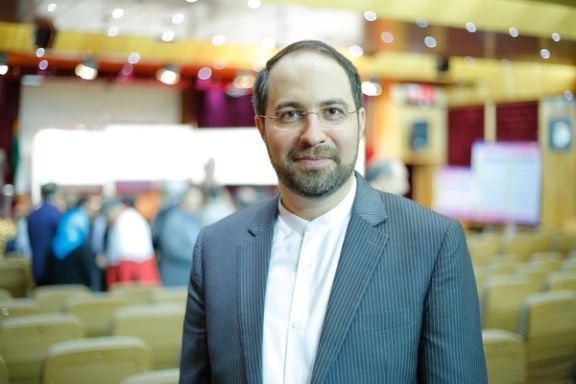
CBSA is also investigating about 100 people with status in Canada for potential ties to Tehran. In a statement provided to CBC News, the agency said that as of November 20, 2023, the it had reviewed approximately 17,800 visa applications for potential inadmissibility to Canada under the IRPA designation of the Iranian regime. As a result, 78 individuals were denied access to Canada.
Concerns about Canada serving as a safe haven for high-ranking Iranian officials were exacerbated after the identification of a former Tehran police chief at a gym near Toronto in 2021.
Under pressure from the opposition Conservatives and the Iranian-Canadian community, the Liberal government, under the leadership of then-public safety minister Marco Mendicino, designated the Islamic Republic of Iran as a "regime that has engaged in terrorism and systematic and gross human rights violations" under the Immigration and Refugee Protection Act (IRPA) in November 2022.
The deportation is in line with sanctions implemented in November 2022, which prevent senior members of the Islamic Republic from entering Canada. The measures were imposed after Mahsa Amini died in custody of Iran's so-called morality police for defying hijab laws. Amini's death garnered international condemnation and became a symbol of resistance against the repression of women under Iran's clerical regime. The incident ignited the boldest uprising against the ruling power since its establishment in 1979. Security forces crushed the uprising by killing about 600, arresting over 22,000 and hanging some of protesters.
In response, Canada classified Iran's government as a regime involved in "terrorism and systematic and gross human rights violations," leading to the effective exclusion of tens of thousands of Iranian officials and Islamic Revolutionary Guard Corps members from entering the country.
Canada severed diplomatic ties with Iran in 2012 due to concerns related to its pursuit of nuclear weapons and support for terrorist organizations including Hamas. The government has also been under pressure for years to list the IRGC as a terrorist organization. Those calls intensified after the IRGC shot down Ukraine International Airlines flight PS752 in 2020 as it was taking off from Tehran, killing all 176 people onboard, including 55 Canadians and 30 permanent residents.
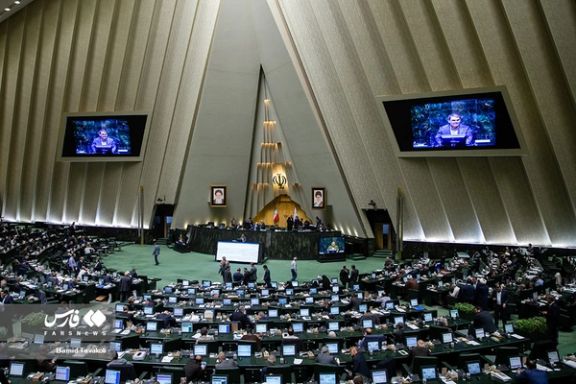
The Iranian parliament is reviewing a bill covering cooperation between Tehran and Moscow on information security, according to IRNA, the Iranian state news agency.
The bill is presented to the parliament in order to implement an agreement signed three years ago by Iran’s former foreign minister Mohammad Javad Zarif and his Russian counterpart, Sergei Lavrov.
The nine-article bill reportedly aims to combat cyber threats, strengthen information security and promote cooperation.
The bill also has a clause that refers to the exchange of information and cooperation in the prosecution of criminal offences between Iran and Russia.
In recent years, Tehran and Moscow have boosted their political, military, communication and cyber relations, raising concerns among Western countries and their allies.
Earlier in November, Microsoft’s Threat Analysis Center (MTAC) reported that Russia, Iran, and China are likely to plan to influence the upcoming elections in the United States and other countries in 2024.
“Election infrastructure, campaigns, and voters” are expected to be targeted by “authoritarian regimes,” Microsoft warned.
The report also confirmed that Iran has intensified its cyberattacks and influence operations since 2020, targeting Israel and Bahrain, for instance.
Back in July, Claudia Plattner, the head of the German Federal Office for Information Security (BSI), warned of a growing threat from Russian, Iranian and Chinese cyber-attacks.
“The goals are espionage, destabilization and influence,” said Plattner, adding that Germany as a European power and supporter of Ukraine is an “attractive target” for hacker groups.
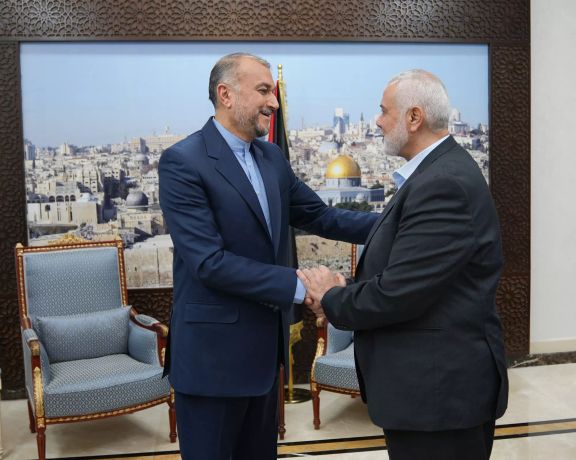
Iran’s Foreign Minister Hossein Amir-Abdollahian says Hamas has so far responded well to the Israeli “aggression” but the coming days will be “extremely frightening” for Israel.
He made the comments during a phone conversation Wednesday evening with his Qatari counterpart, Sheikh Mohammed Bin Abdulrahman Al Thani to discuss the ongoing war in Gaza, Fars news agency affiliated with the IRGC reported.
Amir-Abdollahian, repeating Tehran’s rhetoric, once again accused Israel of violating international laws and carrying out war crimes and genocide in Gaza, the report added.
Despite the allegations made by Tehran officials, the Israeli army, over the past days, has issued warnings and evacuation plans for Palestinians who live in the southern Gaza Strip to minimize civilian casualties in the area.
In a post on X on Wednesday, Amir-Abdollahian also called on Egypt “to open the Rafah border unconditionally for the delivery of medicine, food and fuel throughout Gaza.”
Israel has recently pledged to facilitate the entry of humanitarian aid to the Gaza Strip. Israel regularly screens aid trucks and shipments sent to Gaza to avoid the smuggling of arms and military devices to the region.
Iran, the primary supporter of Hamas, has provided military and financial assistance to the militant organization which launched a deadly onslaught on Israel on October 7, killing 1,200 and taking over 240 people hostages. However, so far, Tehran has refrained from direct involvement in the war to defend its ally.
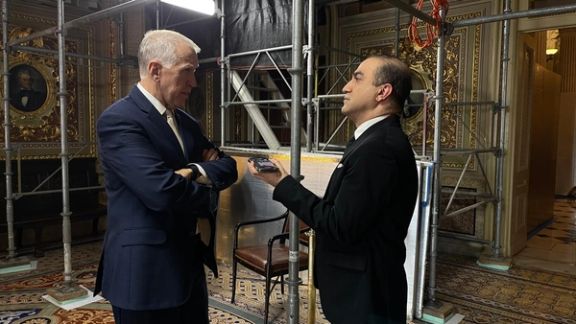
The Biden administration is receiving more and more criticism over its failure to deter Iran and its proxies in the Middle East since the Gaza war broke out in October.
A marked increase in attacks by Iran-backed Houthis has been met by no US retaliation, leaving many lawmakers and officials in Washington confused and dismayed.
“We need to start holding them responsible,” Senator Thom Tillis told Iran International’s Arash Aalaei on Wednesday afternoon. “I think the administration needs to take a firmer stance because we all know that this is aided and abetted by Iran.”
In the past few days, two US destroyers, Carney and Mason, have been forced to engage in military action when they faced missiles and drones launched from territory controlled by Yemeni Houthis.
On Wednesday, the USS Mason intercepted and shot down a drone launched from a Houthi-controlled area. Three days earlier, USS Carney shot down three drones after it received distress calls from vessels that had come under attack from Iran-backed Houthis in the Red Sea.
“Every one of these drones and every one of these missiles that are launched at commercial vehicles are arguably acts of terrorism,” Senator Tillis said.
But the Biden administration seems to be reluctant to act on that basis, stating that it could not be established beyond doubt that the Houthi intended to target American warships.
Senior Biden administration officials are said to be against targeting Houthis for now, according to Politico, even though some military officers are calling for “more forceful responses to the militants’ attacks in the Red Sea.”
President Biden's critics say his lack of action against Iran has enabled and emboldened the regime and its proxies in the region. Many accuse Biden of pursuing a policy of “appeasement” with Tehran.
“The Biden administration has been funneling billions of dollars to the largest sponsor of terror,” Republican Senator Ron Johnson told Iran International’s Arash Alaei Wednesday. “The Biden administration’s weakness has inflamed the world.”
President Biden and his top team have been trying hard to avoid an expansion of the conflict since Hamas forces attacked Israel on 7 October. They seem to be concerned that the regime in Tehran would escalate through its proxies in Yemen, Lebanon, Syria, and Iraq, Politico reported.
More specifically, the US government seems to be concerned that targeting Houthis or even re-designating them as a terror group could jeopardize the Yemen peace process and perhaps the recent thaw between Iran and Saudi Arabia.
Many in Washington see emboldened attacks by Houthis as a direct result of the White House's decision to remove the group from the US terrorism blacklist in the first days of the Biden administration.
“The despicable acts of terrorism in the Red Sea show the recklessness of President Biden’s decision to de-list the Houthis as a foreign terrorist organization when he took office,” said Senator Roger Wicker, ranking member of the Senate Armed Services Committee.
“It is time to deliver a punishing, forceful response to Iran’s proxies throughout the region and re-list the Houthis,” he told the Daily Caller.
Since the beginning of the Israeli onslaught on Gaza, the Houthis have attacked several vessels in the Red Sea and launched drones and missiles towards Israel. But they had avoided direct conflict with the Americans – until last weekend.
This week’s incidents forcing US warships to engage has raised the stakes. Pointing out the failure of the current strategy to deter Iran and its proxies, the Republicans in the Congress are calling on the administration to react with more force.
With no clear end to the conflict in sight, it seems certain that foreign policy, in general, and the relationship with Iran, in particular, would become a hotly contested issue in the next year’s Presidential election.
“You know what WILL send Iran a message of deterrence,” asked Senator Roger Marshall on X, “firing Joe Biden in 11 months.”
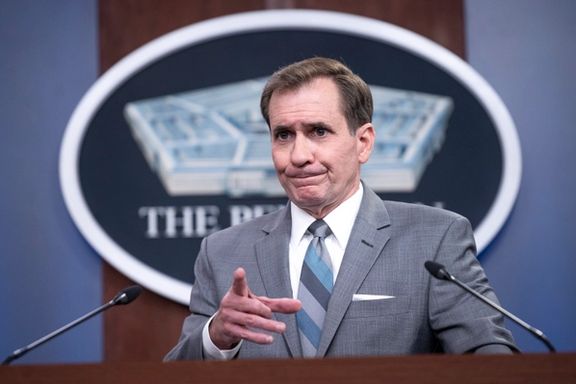
US National Security spokesman John Kirby emphasized on Wednesday that Washington will continue to hold Tehran and Moscow accountable for their growing military ties.
Referring to Iran’s military assistance to Russia and to extremist militant groups in the Middle East, Kirby warned that the burgeoning relationship between Tehran and Moscow “is not only not good for the Ukrainian people but it’s certainly not good for the region.”
If the Iranian regime avails itself of Russian military capabilities, it can become “more lethal and more dangerous to its neighbors,” he added against the backdrop of Iranian President Ebrahim Raisi’s visit to Russia on Thursday.
According to Kirby, the US Department of Treasury has sanctioned nine entities and five individuals who facilitated Moscow’s access to electronics with military applications.
The Department of Commerce has also slapped sanctions against 42 entities around the world for their activities against US interests, especially those engaged in Iran-Russia drone production.
The killings of innocent Ukrainians is partly carried out “through the use of Iranian drones,” Kirby stressed.
Since mid-2022, Iran has reportedly supplied hundreds of kamikaze Unmanned Aerial Vehicles (UAVs) to Russia, which have been extensively used to target civilian infrastructure and cities.
Kirby also pointed to Iran’s backing of its proxy groups in the region, especially Yemen’s Houthis who have time and again attacked US and Israeli interests in the region.
“We know that the Houthis are supported by Iran, not just politically and philosophically but, of course, with weapon systems,” he pointed out.
Though the Islamic Republic has avoided any direct involvement in the Israel-Hamas conflict, the regime has used its allies such as Houthis and Hezbollah to attack Israel and American targets.